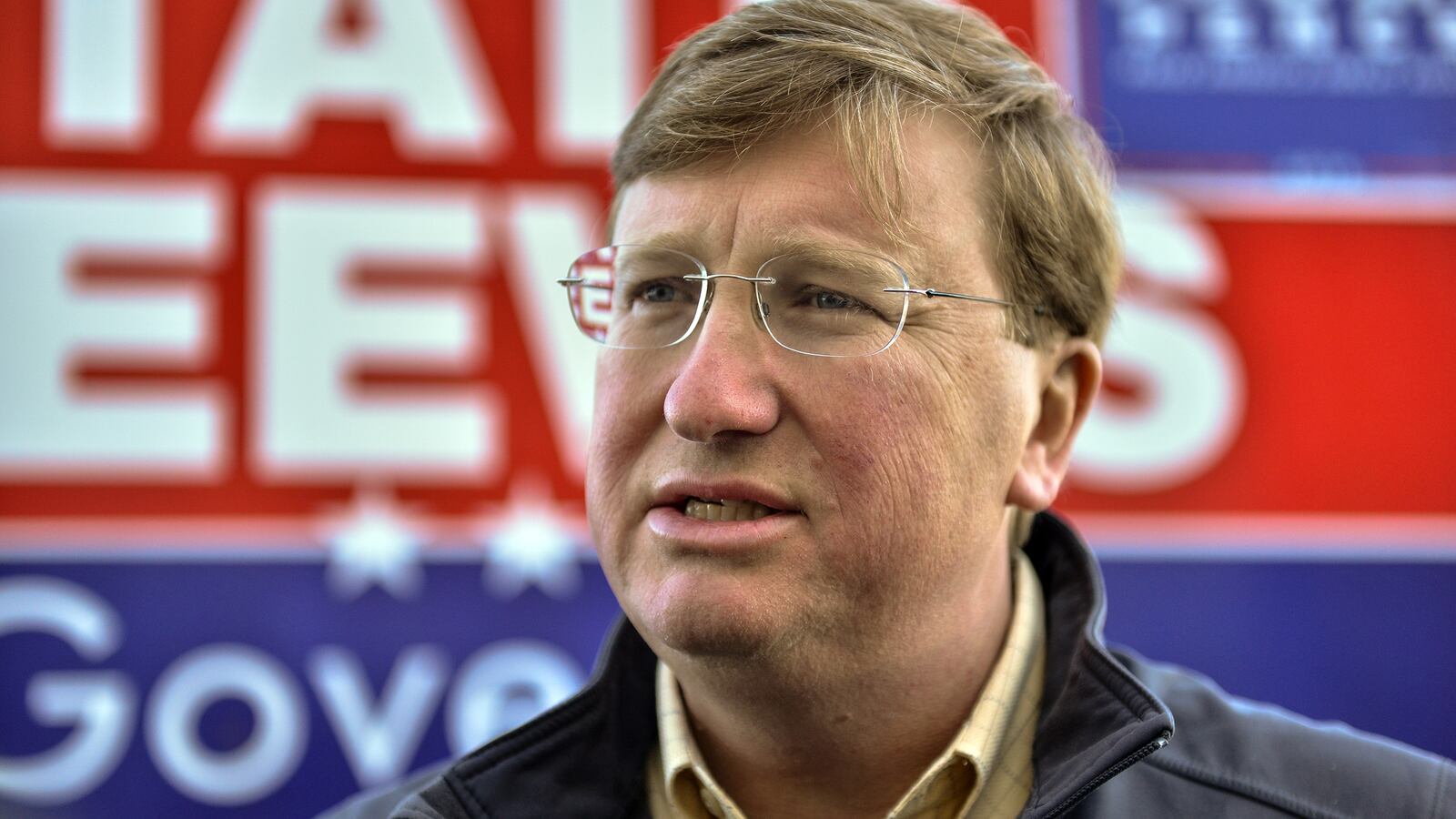As the threat of the coronavirus spreads across the country, governors have been moving forward with aggressive actions designed to leave little room for confusion or error when it comes to best health practices.
And then there’s Tate Reeves of Mississippi.
The first term Republican has made clear that he appreciates the severity of the pandemic, but in the past week he’s left local officials in his state grasping for answers over what, exactly, his response to it is.
The confusion stems from an executive order that Reeves put in place earlier this week that led some local leaders to believe that he was hampering their abilities to direct more aggressive public health measures to contain the coronavirus. Reeves later said the order was meant to be a “floor statewide” for local authorities to follow.
In its wake, some mayors have made their frustrations clear.
"The governor's actions are creating mass confusion and panic across the state," Tupelo Mayor Jason Shelton, a Democrat, said in an interview with The Daily Beast.
Reeves' stewardship of his state through the coronavirus crisis provides an illustration of what happens when executive leadership doesn’t want to be too heavy a government hand. To a certain degree, his actions have mirrored President Donald Trump. But unlike the president, who has no direct control over the decisions states and municipalities make, the results of Reeve’s approach are out there for everyone to see. And what is being witnessed is a state of confusion, even as Mississippi’s health department reports 579 COVID-19 cases and eight deaths.
During a press conference Tuesday, Reeves emphasized the state was not at the end of the pandemic and "may still be at the beginning stages of this fight." He then detailed an executive order that instructed residents to avoid gatherings deemed non-essential of 10 or more people. Employers were instructed to "let every possible employee" work from home.
But when the executive order was published, key language sparked dismay from local leaders who worried the governor’s move would supersede the actions they had already taken in hopes of minimizing the virus in their own communities.
For Moss Point Mayor Mario King, who considers himself an independent, the back and forth has been embarrassing. On Monday, he was unhappy with the governor’s lack of leadership only to feel by Friday that no action from the governor would have been better than what ended up happening.
King now says he’s just embarrassed when it comes to the governor of his state, and believes the governor’s action directly interfered with his own local stay at home order. There's no logic behind the governor’s thought process, he said.
"My thing is Tate, c'mon, you are the governor of Mississippi,” King said. “Just admit that you made a mistake and let us do our jobs because you're interfering with that right now."
Back in Tupelo, Shelton initially said it appeared the governor’s more broad approach superseded local decisions in "no uncertain terms.”
"I don't know if it's intentionally vague or accidentally vague or what, but it's not serving the best interest of the citizens in the state of Mississippi," Shelton said.
By Friday afternoon, the confusion pushed the mayor to essentially have a new mindset over the more aggressive measures he believes his community needs during the pandemic.
“Act without regard to the governor's executive orders and just do what we think is best for Tupelo,” Shelton said.
In Oxford, Mayor Robyn Tannehill said their first interpretation—which left her "very frustrated"—was that the governor’s order superseded what they had done locally and would allow "a lot of businesses to open back up."
But after talking with Reeves, the Democrat came away with the understanding that the stricter resolutions in her community could stay in place “just as they were.”
"Initially it caused a great deal of confusion," she said. "And it's continuing to cause confusion in our community with businesses that had closed that now are saying, 'wait, now I can be open.'”
The governor’s office has tried to play clean up over the order’s language with a spokesperson saying Thursday that they were trying to create “statewide parameters that local leaders on the front lines can build on.”
“The Governor will be issuing a supplement (Thursday) to clarify that no local precautionary measures are overruled by this executive order,” a spokesperson for the governor said in an email.
Reeves made a similar pledge during a press conference that same day, though he chided some critics in the process.
"If you'll recall, some of the same folks that are upset today were upset a week ago because we had not issued statewide guidance on some things," Reeves said Thursday.
Reeves earlier declared a state of emergency and ordered public schools closed until April 17. He has also said the state wouldn't make "rash decisions simply because some other states decide to do things." He has emphasized social distancing and urged residents of his state to practice "very sanitary means," and ensure “that you are being smart." On Twitter he’s urged residents to “stay home if you can.”
During a livestream Monday, where he answered submitted questions, Reeves stood in line with the approach Trump has taken during his presidential press briefings. The governor said he wouldn't make decisions with the "potential of really causing more harm than they have of actually producing good."
"If you feel that a statewide lockdown should be occurring, then you should put yourself on individual lockdown," Reeves said at the time. "If that's what you believe is best for you and your family, then that's fine. That is not the guidance that we are getting from our experts."
At one point, an online questioner challenged Reeves that China did a lockdown and "it was good for them."
"Why can't Mississippi?" the question read.
"Mississippi's never going to be China," Reeves said. "Mississippi's never going to be North Korea."
Reeves’ resistance to dramatic public health measures stands in contrast to those governors who are on the frontlines of the coronavirus fight. The Republican governor of Ohio issued a stay at home order on Sunday and according to The New York Times a slew of states both led by Democrats and Republicans have made similar moves. In neighboring Louisiana, a stay at home order also came out Sunday.
Health experts remain anxious about the differences between different states approaches as the pandemic plays out, fearful that a virus won’t respect state lines.
"It certainly would help if it's realized that infections don't stop at the state border,"said Dr. Arnold S. Monto, a professor of epidemiology at the University of Michigan. "If there are contrary policies in different states, it certainly is not helpful."






